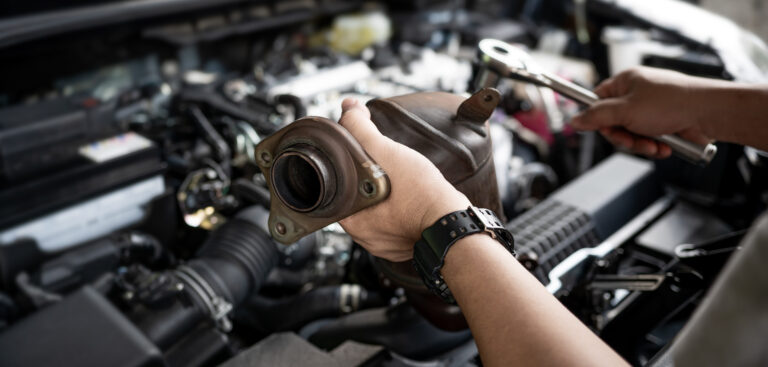A new study published recently in the journal Chemistry of Materials, by researchers at Ohio State University, suggests that the next generation of catalytic converters could have longer lifetimes and need fewer rare materials to operate. A good catalytic converter can last for more than a decade, but according to Cheng-Han Li, lead author of the study, there’s always room for improvement. He said future catalytic technologies could be designed to effectively scrub pollutants for a longer time.
“We want to have a better lifetime for catalytic converters. Otherwise, they will have to be replaced or won’t pass the government’s emission tests,” said Li, a doctoral student in materials science and engineering at OSU.
Although there are various types, modern catalytic converters use a combination of three precious metals: palladium, platinum and rhodium. Rising prices for these three precious metals – especially rhodium – are why criminals across the globe have resorted to stealing catalytic converters. Found most often in the river sands of North and South America, rhodium is considered the rarest element in the world and is more valuable than gold and platinum.
“The cost of rhodium has risen dramatically over the past years due to increasing demand coupled with a fundamental supply deficit,” noted Li. Since rhodium-based catalysts are in short supply, it’s imperative that they be utilized as effectively as possible. Because the catalysts have been known to deactivate at high temperatures, researchers investigated how their performance changes over time in the presence of high heat.
To do this, Li’s team performed several tests on the converters, including having them endure temperatures higher than 871°C. While catalysts rarely exceed such conditions in a running car, they may experience those temperatures at least occasionally over their lifetimes, especially as the converters get older.
The researchers used a transmission electron microscope to study the microstructures of the three-way catalysts at the atomic level and how they were affected by the heat. “By observing the microstructure, we can make the connection between high heat, the converter’s real performance and its microstructure,” said Li. He noted that rhodium catalysts are supported by oxides like alumina and ceria-zirconia, which help stabilize them.
At high heat with oxygen, rhodium dissolves into the alumina and degrades into the stable solution rhodium aluminate. This solution, however, is chemically inactive, meaning that it can’t scrub away harmful pollutants and gases, making the device effectively useless. However, when exposed to hydrogen, some of the rhodium becomes active again, but not nearly enough to return the catalyst converter to its former efficiency.
The study’s findings showed that in the long run, establishing a new design that prevents the formation of rhodium aluminate could help get the most out of these devices. This in-depth understanding of the device’s structure could also help inform better designs for future catalytic converters. “Our results give car manufacturers a specific direction to follow to optimize the use of rhodium-based catalysts,” said Li.
Co-authors of the paper were Jason Wu, Andrew Bean Getsoian and Giovanni Cavataio of the Ford Motor Company, and Joerg Jinschek, an associate professor of materials science and engineering at Ohio State. The study was funded by the OSU-Ford Alliance Project.


